HarmonicDyne’s new iteration of the Zeus sport an entirely new diaphragm design–but that alone doesn’t make them a worthy successor.
HarmonicDyne, a relative newcomer to the audio game, has already logged a few hits with the Helios and the Zeus. These two open-back headphones gained some traction within the headphone community.
Both headphones were known for a very warm sound signature. Their unabashed mid-bass emphasis elicited comparisons to the now out-of-production AudioQuest Nighthawk.
Of course, such a sound isn’t for everyone, but they covered a niche left open in the mid-fi market. There are plenty of warm-tilted options on the pricier side from companies like Audeze, ZMF, and Meze, but many of the most acclaimed products from the mid-fi sector just aren’t that warm, opting instead for “clear” or “neutral” tunings.
So when I was offered the opportunity to review the newest HarmonicDyne product, I jumped at the chance. I had to know what this manufacturer was cooking.
- Relatively clear sound
- Excellent bass extension
- V-shaped sound signature creates unique position in the market
- Grill looks cool
- Bass lacks texture
- Unbalanced, recessed midrange
- Incoherent sound signature
- Not enough padding on the headband
- No single-ended cable or adapter
This new pair of headphones abandons the beryllium-coated dynamic driver of the original Zeus in favor of a “suspension diaphragm” consisting of two layers of “inert composite film” bonded by an “acoustic adhesive.”
Company Overview
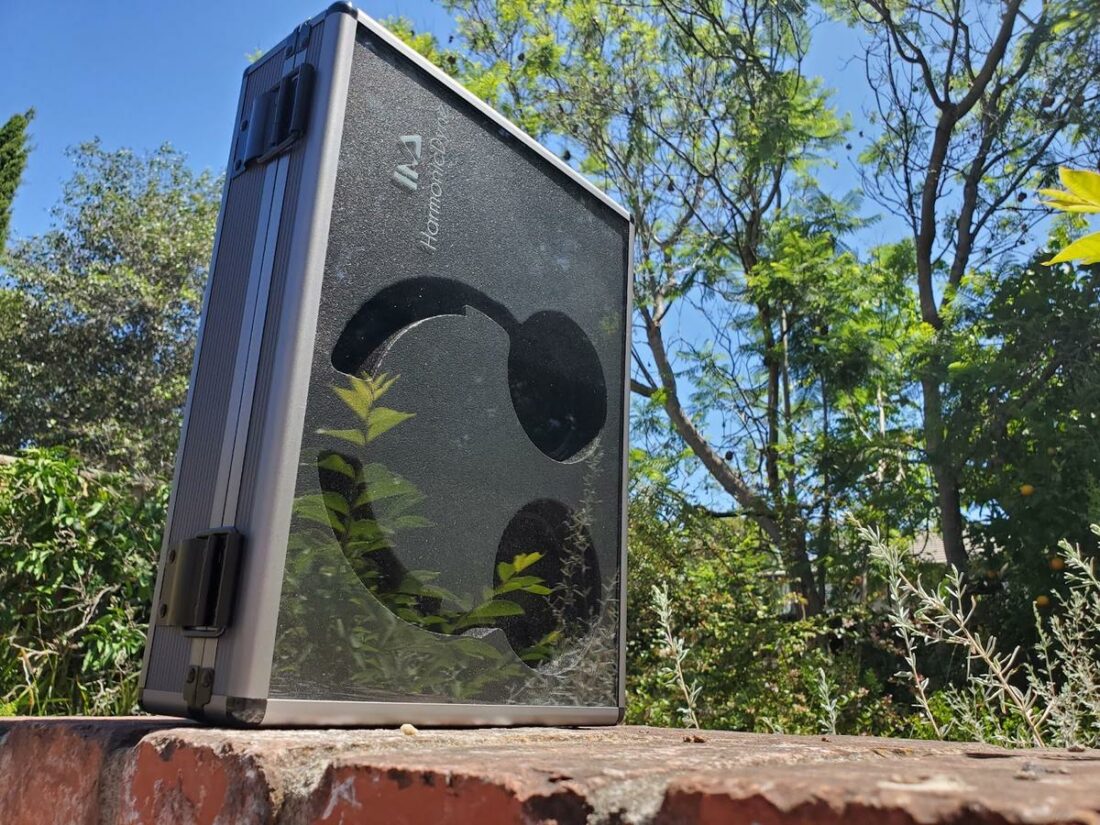
HarmonicDyne seems to be a brand operated and supported by audio distribution website Linsoul.
It’s no secret that Linsoul has made itself a major fixture in the audio community, largely by being one of the most reputed vendors of Chi-fi products overseas. They’re kingmakers, and HarmonicDyne is one of the latest of this company’s darlings.
HarmonicDyne’s headphones look and sound distinctive, with complex grill designs and warm tunings.
Technical Specifications
- Form: Over-ear, open-back
- Driver: Composite dynamic driver
- Impedance: 32 Ω
- Sensitivity (dB): 105 dB/mW
- Frequency Response (Hz): 10Hz – 70kHz
- Removable Cable: Y
- Source Plug: 4-pin XLR and 4.4mm balanced included
- Cup Jack: 3.5mm
- Weight (g): 360g
Packaging
The Zeus Elite, like their predecessors, come in a rather official-looking briefcase filled with foam. However, unlike their predecessors, the front of this briefcase is a piece of clear plastic or plexiglass. I’m unsure why they made this decision, as it makes the whole assembly feel less “official.”
Nonetheless, the briefcase is a nice touch and provides a great start to the unboxing experience.
Accessories
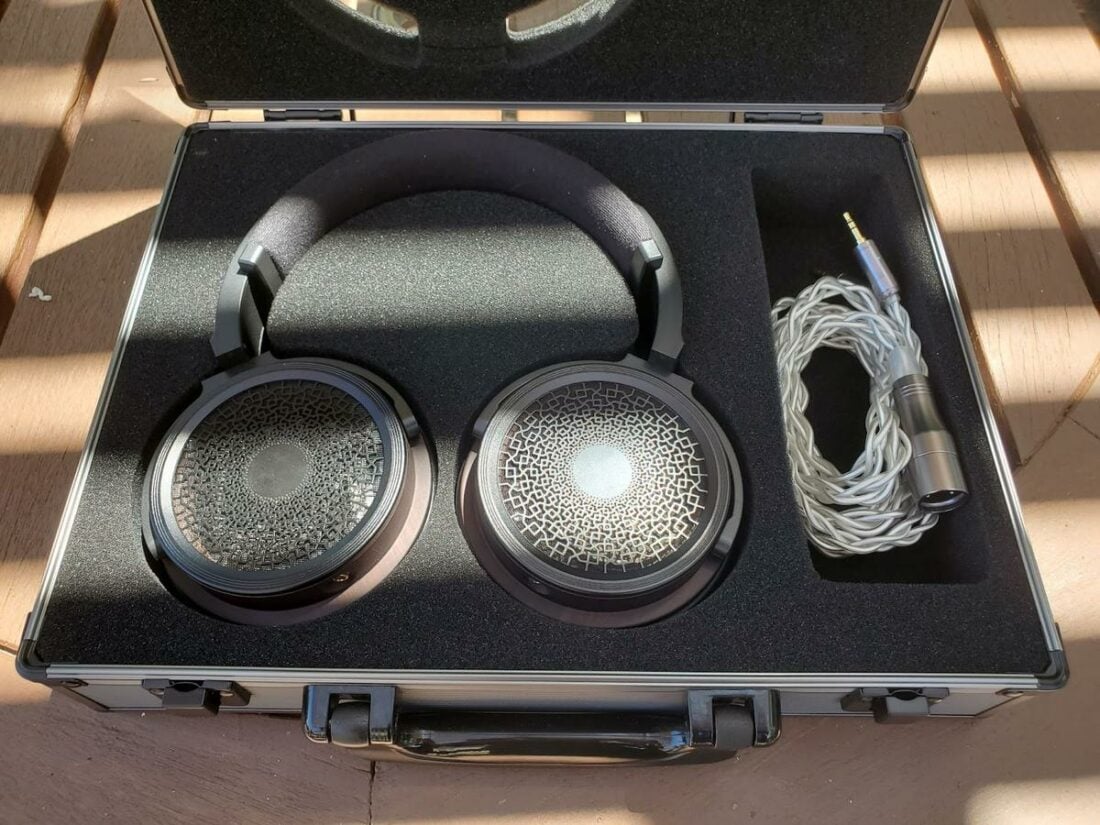
It’s a relatively no-frills affair inside the briefcase: the headphones are nestled in a headphone-shaped cutout, with the cables in a small box off to the side. It’s a standard formula, but one that works.
HarmonicDyne made some “interesting” choices with the cables. Buyers are treated to a 4-pin XLR balanced cable and a 4.4mm 4-pole balanced cable. I can’t help but ask, “why?” The Zeus Elite are very easy to drive, and a balanced source is unnecessary.
No single-ended cable is included!
Design
Looking at pictures of the Zeus Elite, I was struck by their intricate grill design. This is something that the folks at Harmonicdyne like to do, and I believe the Zeus Elite’s grills are the coolest yet. They’re made of machined aluminum, and they feel very nice.
But I can’t help but think that some parts of the Zeus Elite’s design reflect somewhat poor taste. For example, the top of the headband seems to be a textured plastic emulating vinyl faux leather, which reminds me of the inside of my economy car.
The wood paneling on parts of the headband also seems somewhat incongruous, as it doesn’t match the wood on the earcups.
On the other hand, the stainless steel that’s revealed as one adjusts the headband is a nice touch.
Comfort
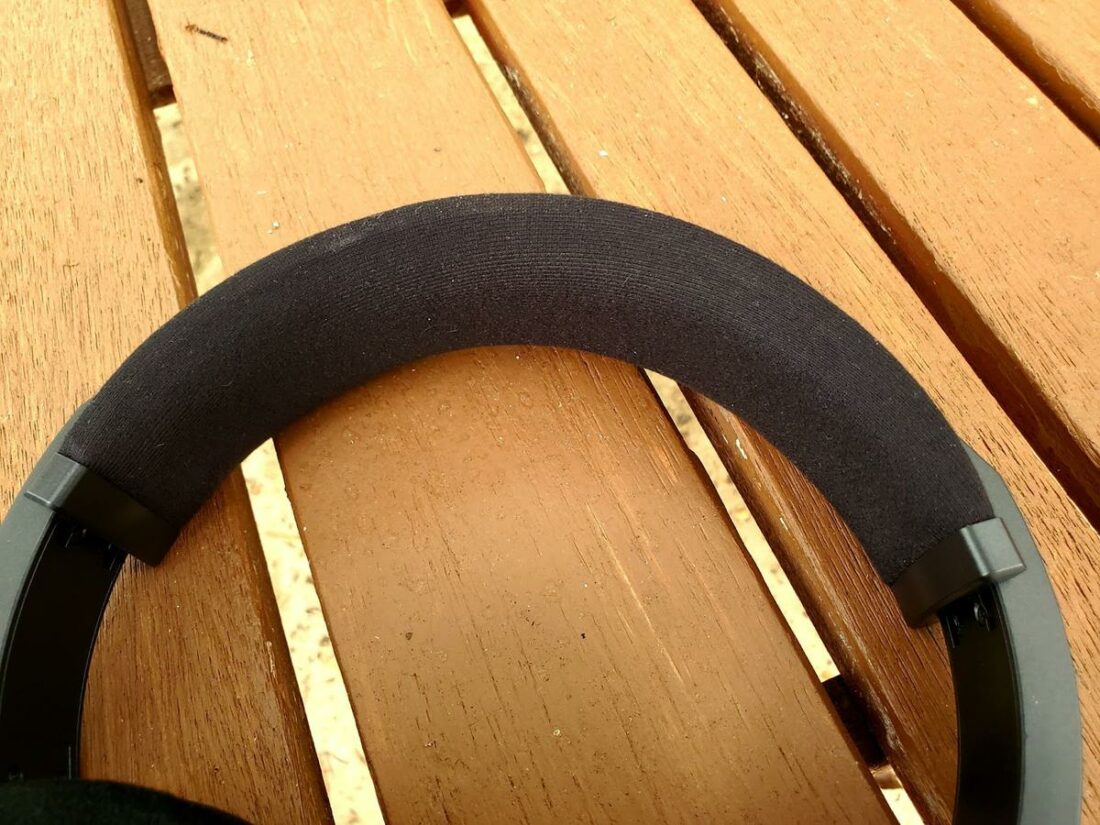
The Zeus Elite are fairly light, clocking in at 360g.
This doesn’t translate to a comfortable experience.
I would like to see more padding on the headband, which has the potential to generate hotspots.
The earpads, also, are functional but not luxurious. The material doesn’t feel very premium, and the foam used is a bit stiff. However, they didn’t create any serious comfort issues, and I can easily use the headphones for a reasonably lengthy period of time.
Zeus Elite Sound
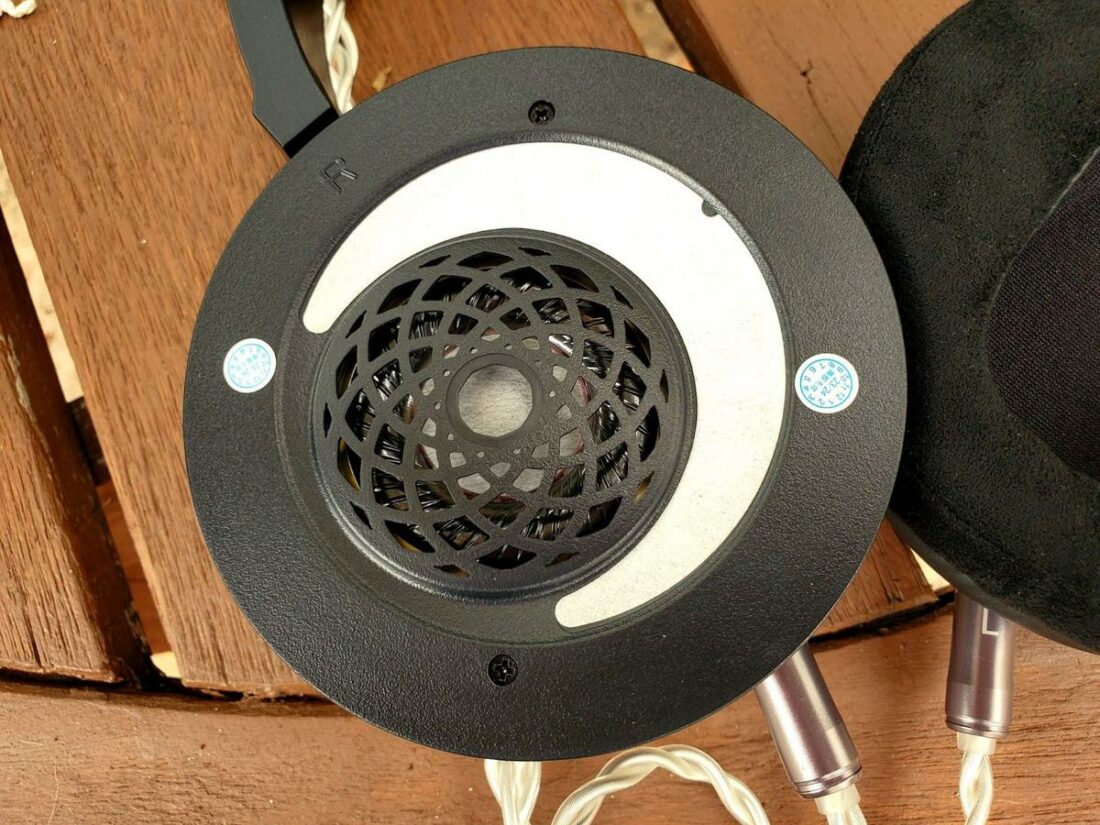
While the original Zeus have been described as an overall warm-sounding pair of headphones, the Zeus Elite go a different direction with their tonality.
These headphones are fairly V-shaped in sound.
This means that the midrange – i.e., the frequency band that voices and instruments mostly fall into – is pulled back relative to the bass and treble. The benefit of this frequency response is an increased bass presence, leading to engagement and a greater sense of detail from the elevated treble.
When done right, this can be a very fun, engaging sound signature. We don’t usually see it attempted in lower-cost open-back dynamic-driver headphones because achieving a good bass response can be difficult without spending more on a higher-end driver.
The Zeus Elite achieve good bass extension but at the cost of certain side-effects that negatively impact other areas of the sound signature.
Bass
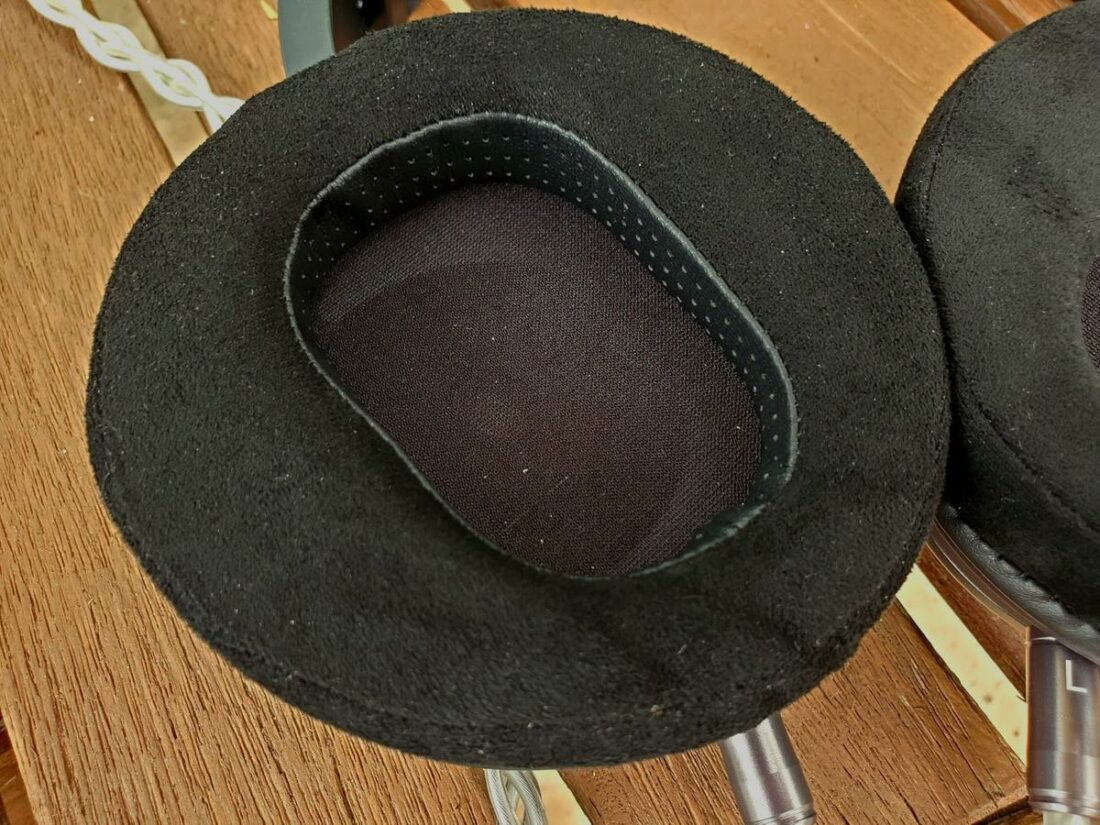
Bass is the star attraction of the Zeus Elite and is the primary reason you should consider these headphones.
It’s no secret that manufacturers have had issues in the past with achieving good bass performance with the open-back dynamic-driver form factor. There is usually a mid-bass hump followed by some degree of roll-off on the low end.
The good news for the Zeus Elite is that there is fairly little roll-off in the low end. There is roll-off below 40 Hz, but above that, everything is audible. That’s quite good for the category.
However, the bass on offer here is not the most textured or resolving. The Zeus Elite’s bass is a little woolly and one-note. So while you get an incredibly deep rumble in tracks like Burial’s Archangel, instruments like the bass guitar in Yes’s Roundabout can get vague and lumbering.
For those looking for that rumble, the Zeus Elite outdo all their open-back competition. Due to the textural shortcomings of the bass, though, I’d accept some roll-off (e.g., the Drop x Sennheiser HD6XX or Beyerdynamic DT880) or less emphasis (e.g., the Hifiman Sundara) to achieve greater clarity.
Midrange
In keeping with the V-shaped tuning, the midrange of the Zeus Elite decidedly takes a back seat to the bass and treble.
The issue I’ve always had with the V-shape tuning is that the transition between bass and midrange can create an incoherent or disjointed, and that problem is present to an extent with the Zeus Elite.
While instruments that play fundamentals in the bass or midbass like bass guitar, male vocals, or cello feel full and warm, instruments that play higher fundamentals feel cold and get pushed back in the mix.
This imbalance has me reaching for the volume knob more often than I’d like, as the track’s overall volume can shift depending on whether the instruments playing fall into the recessed areas of the sound signature. Most acoustic music and a good chunk of rock simply sounds off with these headphones.
The overall sound of the midrange is not entirely natural, resulting in severe genre restrictions.
However, this type of response can work well with genres like techno and dub. In King In My Empire by Cornell Campbell and Rhythm & Sound, the voice floats like a ghostly presence over the throbbing kick drums and synth bass. In Golddust, the percussion and bass are able to lend full support to Danny Brown’s voice.
Treble
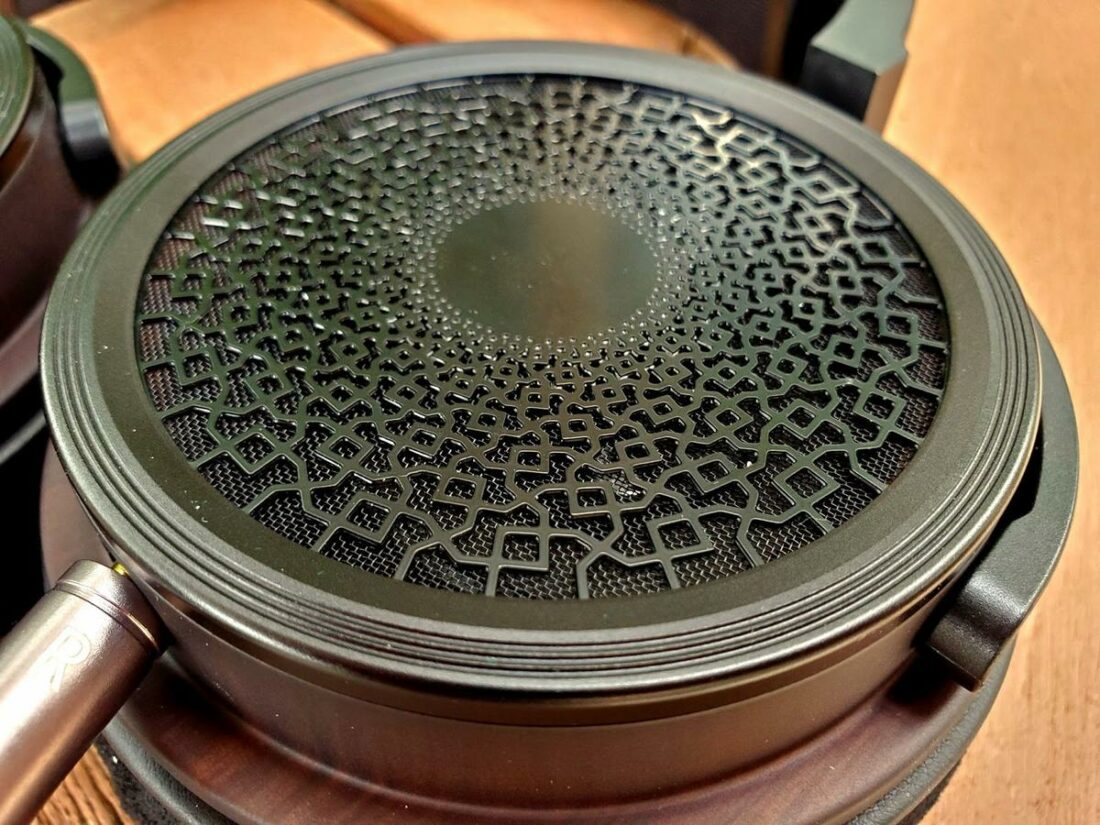
While the upper midrange is subdued, the Zeus Elite compensate to an extent with a small peak at 5 kHz. It’s never piercing or overtly bothersome, but I don’t really like this peak – it only adds further unevenness to an already choppy frequency response, and it’s narrow enough that it can affect different tracks quite inconsistently.
Overall treble performance is simply unexceptional.
Sounds in the treble can often come off as smeared or imprecise. This is common among headphones at this price range but not desirable.
Oiran I by Meitei contains a cornucopia of samples from different origins with different treble signatures. A good transducer can separate out these samples and reveal the harmony between them. With the Zeus Elite, the sources jumble together, and some of them are rendered nearly unintelligible, with an artificial timbre.
Violet Monumental II by Tim Hecker contains some sounds in the treble that are derived from the sounds of clarinet keys clicking. The Sennheiser HD600 and, to a lesser extent, the Sivga Luan resolve these sounds naturally, making the source clear. With the Zeus Elite, they sound more like bursts of static.
Technicalities
All of these issues might be acceptable if the Zeus Elite had very good technicalities. But compared to other similarly-priced headphones, like the aforementioned Sennheiser HD600, the Zeus Elite are a step down in every regard.
Low-level detail is noticeably absent, with sounds often being robbed of texture. They are still resolving compared to most cheap consumer headphones, but I would like to see better at this price.
The bass provides a sense of dynamics and slam, but transients are quite rounded-off and lack definition, even relative to the HD600, which are not known to be that dynamic.
Imaging is not great, and the soundstage is quite flat. The “3-blob” effect is very noticeable. This is where sounds can be pinpointed to the center, left, or right of the stage, but there’s no real space in between. Again, the lack of detail may account for this.
Where to Buy?
Conclusion
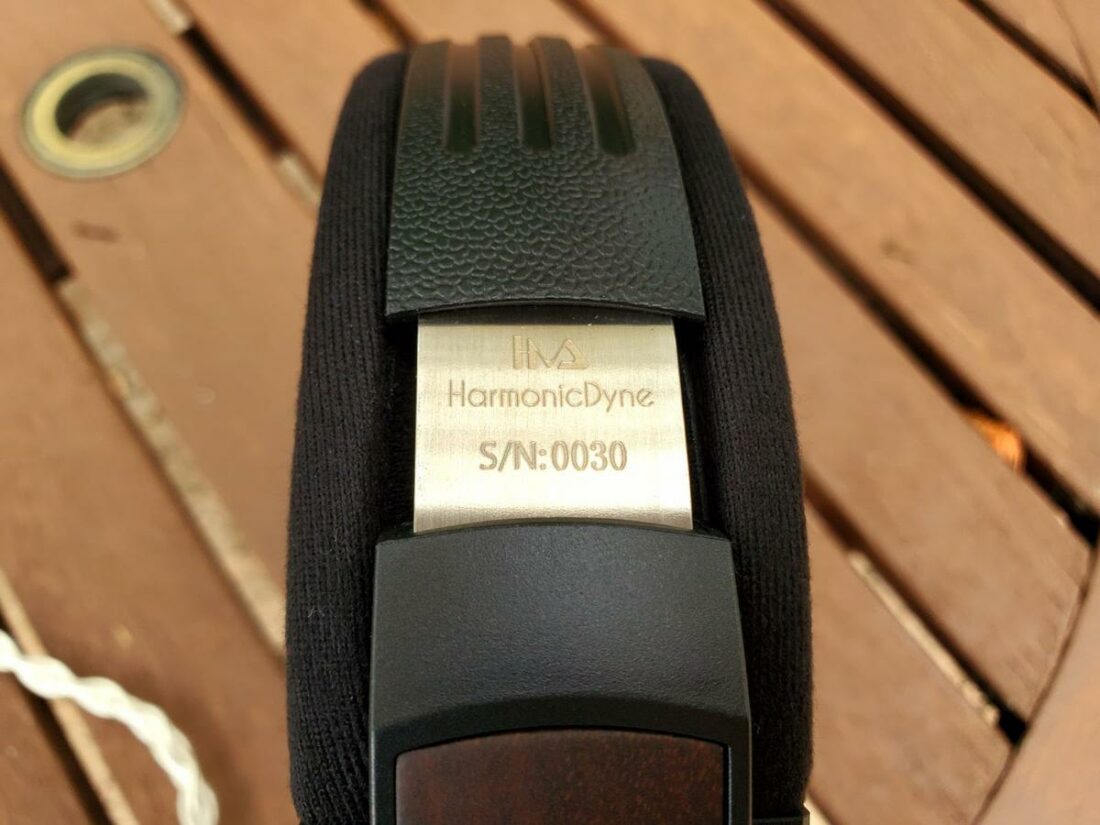
The HarmonicDyne Zeus Elite attempt to fill a role in the market that perhaps doesn’t need to be filled. Those looking for powerful bass at this price should probably be looking at closed-back options like the Meze 99 Classic.
Relative to the Zeus, they improve on matters like bass response but may not be overall better due to their odd tonality.
Overall, the HarmonicDyne Zeus Elite are respectable for what they attempt, but they need more refinement to justify their price to me. To be blunt, I don’t find them particularly pleasant to listen to.
HarmonicDyne should consider evening out the midrange.
However, for those who want a V-shaped sound signature in an open-back form factor, the HarmonicDyne Zeus Elite may be the best option around the ~USD$350 price point.
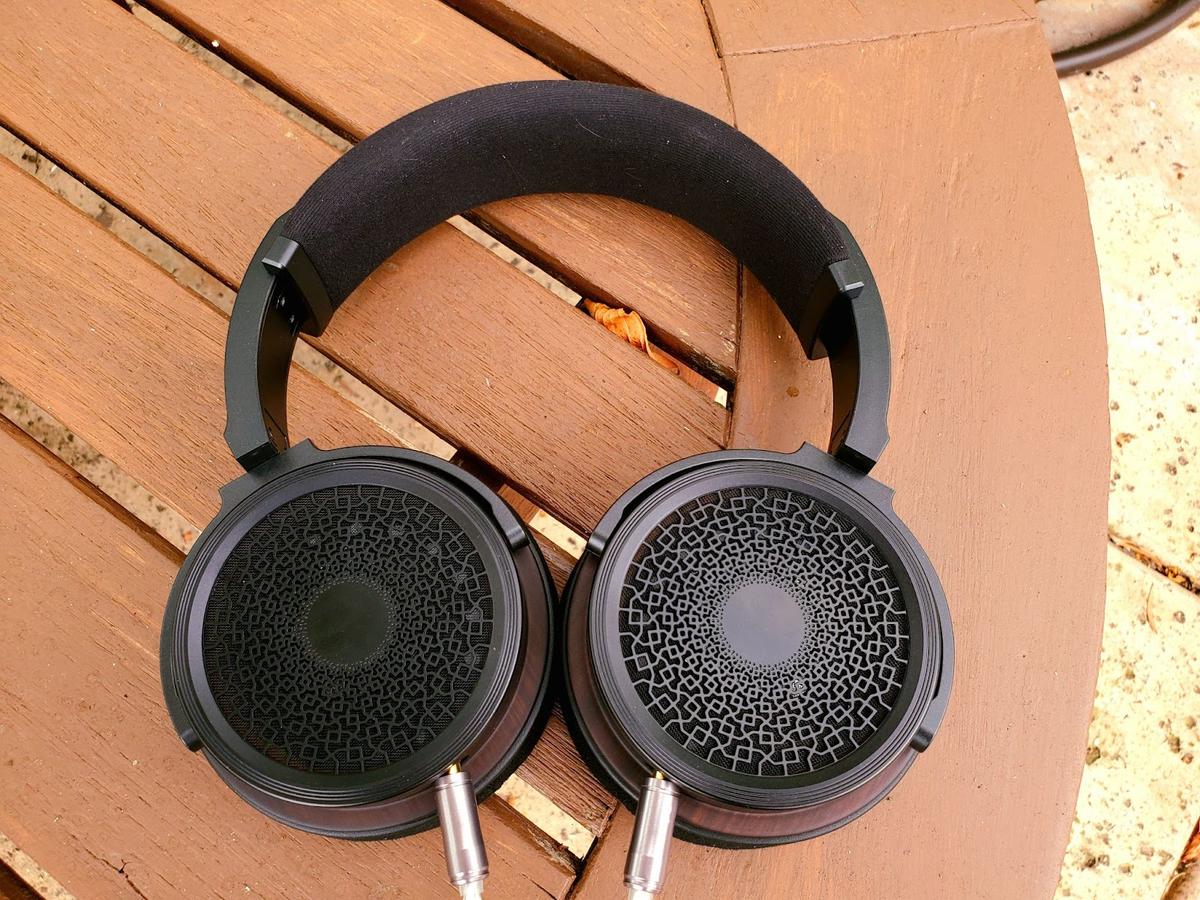
Not to discount your experience, but these are being praised by some pretty reputable reviewers, and your your review contrast theirs drastically. Is there a possibility that you got a bad unit, or then something went wrong in the testing product?
I don’t have a “horse in this race,” as I haven’t personally heard them. It’s just that I usually don’t see such a drastically different take on this site, so I wondered if there were other factors changing the experience.
Hi Tod, thanks for your very civil reply! I don’t go out of my way to read reviews of the products I’m writing about but my experience of the product was fairly consistent with measurements and what other reviewers have reported, and I was driving the headphones with a very capable DAC/amp combo that has not given me problems with any of my headphones of choice (Schiit Jotunheim 2 & Modi 3).
It’s worth noting that a 2.5/5 rating is hovering around average, and is not necessarily a condemnation. However, at $379 (a very competitive price bracket), there are options that offer much better tuning and better technical ability (dynamics, resolution, etc.).
Most reviewers frankly don’t like to publish negative reviews of products for various reasons, commercial or otherwise. In fact, in a previous role at another major audio publication, I was explicitly told not to write any negative reviews. At Headphonesty we don’t like to play those games. I don’t particularly enjoy giving a product a negative review myself (I much prefer to find things to enjoy about a product), but it’s my duty to readers to provide them with my unvarnished opinion based on my experience with many different audio products, rather than trying to create “hype.”
Thanks for reading and I hope you understand where I’m coming from!
I found these to be improved a lot by swapping out the stock pads with some Dekoni Elite Hybrids.
Hey Sean, which model fits the zeus?